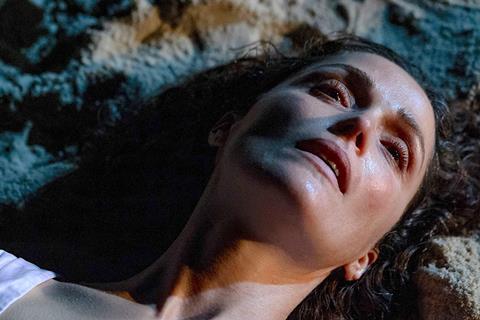Rose Byrne plays a mother on the brink in this ‘white-knuckle ride’ from director Mary Bronstein

Dir/scr: Mary Bronstein. US. 2024. 113mins
Motherhood becomes a psychological battleground in writer-director Mary Bronstein’s gripping second feature, which casts Rose Byrne as a working parent unable to slow her downward spiral. If I Had Legs I’d Kick You puts us in the frenzied head of its main character, who loses her equilibrium after a series of accidents, stresses and poor decisions puts her at a breaking point. The film starts off at maximum intensity and only increases from there, examining parental guilt and our self-help culture as Byrne’s character implodes.
Byrne is raw, brittle and believably volatile
Following Bronstein’s 2008 debut Yeast, and premiering in Sundance before playing Berlin competition and releasing in the US through A24, If I Had Legs is produced by Elara Pictures, co-run by Uncut Gems’ co-director Josh Safdie and co-writer Ronald Bronstein (Mary’s husband), and one could certainly view this film as a spiritual cousin to that nerve-wracking portrait of a compulsive gambler. This film is more about its protagonist’s inner turmoil, however, and adventurous arthouse crowds should be captivated by the white-knuckle emotional ride.
New York therapist Linda (Byrne) is raising her young, very sick daughter (Delaney Quinn) practically on her own. (Her husband Charlie, played by Christian Slater, is just a voice on the phone, always away for work.) Early on, her apartment ceiling caves in after a massive water leak, forcing them to stay in a seedy motel while she waits fruitlessly for her superintendent to fix the damage. But this is only one challenge for Linda: she also must contend with a needy, possibly unstable client, Caroline (Danielle Macdonald); her own increasingly frustrated therapist (Conan O’Brien); and a concerned physician, Dr. Spring (Mary Bronstein), who insists that Linda make time to talk to her about the child’s mysterious ailment.
If I Had Legs opens tight on Linda’s tired, frantic eyes, setting the stage for the pressure cooker the character finds herself in across the picture’s runtime. Notably, we never see her child’s face — or learn her name — creating the impression that her daughter (whose anxious voice we frequently hear) is more of a stress abstraction constantly pulling on Linda. Many of the people around Linda also go nameless, adding to the sense of disorientation accentuated by cinematographer Christopher Messina’s gritty lensing.
There has been no shortage of films about the challenges of motherhood, including the recent Nightbitch, but Bronstein has crafted one that is particularly unsettling because of its fascinating ambiguities. We learn little about Linda’s backstory, and the writer-director never suggests that there is something inherently ‘wrong’ with Linda. And yet, Byrne’s violently temperamental turn offers myriad hints about this high-strung, distracted character who leans on booze and drugs to calm herself when she’s not trying pointless breathing exercises. There’s no relief for Linda, who must attach fresh nutrient bags to her daughter’s IV drip every night while worrying the girl isn’t gaining enough weight, and her exhaustion and frayed psyche detract from every aspect of her life. (Caroline – also a struggling, overprotective young mother – seems to be the only one of Linda’s patients to whom she gives even a modicum of focus.)
Linda’s husband constantly berates her on the phone, asking why she hasn’t made an appointment with Dr. Spring and why she allowed the hole in the apartment ceiling to get so big. It makes no difference which of Linda’s problems are her fault — she is blamed for everything and, additionally, harbours guilt for her daughter’s condition. Bronstein (whose late mother was named Linda) pitilessly portrays modern motherhood as an unrelenting obstacle course of tears, aggravation and failure, recognising how it can constantly chip away at a woman’s mental health. At times, Linda sees strange visions — a product of her delirious state, perhaps, or maybe a sign of something more troubling — and Lucian Johnston’s jagged editing only amplifies the feeling of perpetual panic.
Byrne is raw, brittle and believably volatile, bringing such immediacy and nervous energy to every scene that we understand why Linda cannot think straight — and why the seemingly most simple tasks (like making an appointment with the doctor) are beyond her. Veteran late-night host Conan O’Brien gives a fine turn as Linda’s weary therapist, who clearly shares some sort of past with this combative woman. And Macdonald adds a necessary thematic layer playing another flailing mother who, remarkably, may be in even worse shape than Linda. Throughout the film, characters speak in the touchy-feely language of self-care — therapy aphorisms, banal inspirational quotes — but nothing provides solace. Linda is profoundly alone, trying to keep her head above water as the waves come crashing down.
Production companies: Elara Pictures, Fat City, Bronxburgh
International sales: A24, sales@a24films.com
Producers: Sara Murphy, Ryan Zacarias, Ronald Bronstein, Josh Safdie, Eli Bush, Conor Hannon, Richie Doyle
Cinematography: Christopher Messina
Production design: Carmen Navis
Editing: Lucian Johnston
Main cast: Rose Byrne, Conan O’Brien, Danielle Macdonald, Delaney Quinn, Christian Slater, A$AP Rocky
























